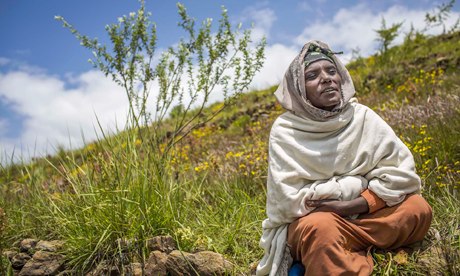 |
| Zenebech Yeman, 30, has benefitted from Concern's programme in her village of Dessie Zruia. Photograph: Jiro Ose/Concern Worldwide |
Dessie Zuria is one of the most critically food insecure woredas (districts) in Ethiopia. About 90% of the population is dependent on rain-fed agriculture in the area, where drought is a perennial problem. The high altitude (upwards of 2,400m) restricts the crops that can be grown, and farmers have been reduced to growing a single staple – barley.
The majority of the area's craggy, mountainous terrain is not suitable for agriculture, and soil degradation has reduced the productivity of much of the remaining land. Unsurprising, the local population is highly susceptible to water shortages, and the rate of chronic malnut
rition – a staggeringly high 54% – is 10% above the national average.
However, the humble potato – previously unknown in this region of Ethiopia – is helping to transform the lives of thousands of the poorest farmers.
"I was dependent on barley, which is highly vulnerable to the shortage of rain, and my income was very, very minimal," explained Seid Muhie, 30, a farmer from Dessie Zuria's Gelsha kebele parish. "I was ready to sell my land, settle in a nearby town and become a day labourer. But after growing potatoes, I changed my plans."
Muhie was only able to grow 75kg of barley a year on his 1.5 hectare (4.05 acre) plot of land, earning just 450 birr ($24). He found it difficult to support his family. But four years ago, with the help of the NGO Concern Worldwide, he started planting potatoes.
"The harvest was very good. I produced 40 50kg sacks of potatoes from the same plot of land, and I sold them for 170 birr each sack. I was surprised by the income that I could get from the potatoes," Seid said.
In 2007, Concern started a potato pilot project with just 16 households. The yields from that first season were high, and soon the charity was inundated with requests for seed potatoes. So far 10,000 farmers in Dessie Zuria have benefitted from the project, and the woreda administration has rolled the programme out to a further 7,000 smallholders.
"The potato is now becoming a main crop in Dessie Zuria. And nutrition has improved," said Concern project manager Merid Fantaye.
Seid can attest to this. His family now eats potatoes at least four times a week – daily, if there is a food shortage. "The potato is a solution for hunger," he said. "If there is no injera [a flat unleavened bread that is the staple in much of Ethiopia] we don't worry."
Though global hunger has declined by one-third since 1990, about 842 million people are still chronically undernourished. According to the 2013 global hunger index (GHI), published this week, levels of hunger in 19 countries – the majority of them in sub-Saharan Africa – are alarming or extremely alarming, and the overall level of hunger in the world remains serious.
The authors of the GHI, Concern, the German NGO Welthungerhilfe, and the International Food Policy Research Institute, blamed the continued vulnerability to food shortages on unpredictable shocks – from storms and droughts to high food prices and political instability – to which the world's poorest people are continually exposed.
They have called for a wider focus on building resilience to ensure that communities and households are able to deal with the short-term stresses that push them from subsistence into crisis.
Crop diversification – which includes the introduction of apples and pears as well as potatoes – offers a way to build resilience, and is one small part of the integrated development programme that Concern has been implementing in Dessie Zuria and nearby Delanta. Working with the poorest people in these highly impoverished communities, the project focuses on watershed management, small-scale irrigation, the provision of clean water supplies, health and sanitation education, child-feeding techniques, and the economic empowerment of women through microfinancing and self-help groups.
"If you knock on the door of one of the poorest households you can find … food insecurity, water, sanitation and hygiene problems, health problems, inequality and other things. To address these issues, a multi-sectoral approach is very important," said Endalamaw Belay, north area co-ordinator for Concern.
Belay is convinced that this integrated strategy has improved the resilience of farmers in Dessie Zuria. "Previously our beneficiaries had nothing, so they would migrate to another area," he said. "But currently they have a better capacity to resist if there is a drought in the future."
Certainly the residents of Atinit Mesberia kebele are now better able to cope with the failure of rains or other shocks. The construction of terracing on the high peak above the neighbourhood and the building of a small irrigation canal have reaped dividends. The risk of flash flooding has reduced, soil degradation has been halted, and productivity has increased for the watershed's 200 households.
"My wife is also a member of the savings and credit co-operative set up by Concern. She got three ewes and one ram as a credit," said Seid Asan Abegas, 38, who owns a 0.75 hectare plot of land in Atinit Mesberia. He now has 30 sheep, and has constructed two huts from the sale of his livestock – one for his animals, the other for storing hay and seeds – as well as a corrugated iron-roofed house. "Before, I was a dependent on my family," he said. "I had no assets. I am now independent."
http://www.theguardian.com

No comments:
Post a Comment